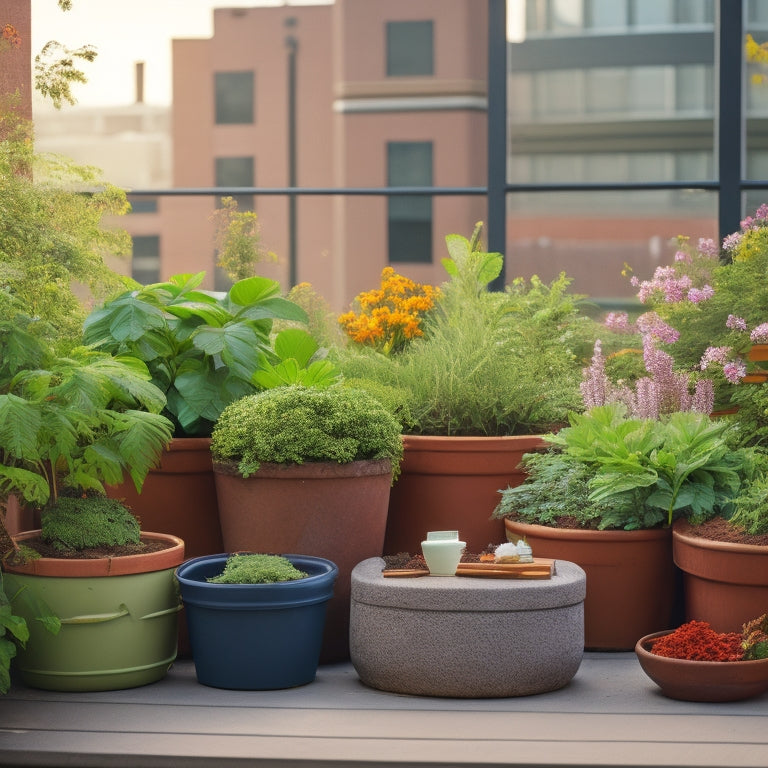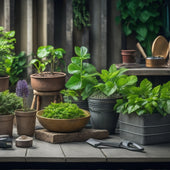
5 Best Natural Fertilizer Recipes for Rooftop Gardens
Share
You can create a thriving rooftop garden using five effective natural fertilizer recipes. Combine banana peels and coffee grounds for a nutrient-rich fertilizer that promotes healthy root growth and repels pests. Alternatively, mix Epsom salt and eggshells to enrich soil with magnesium, calcium, and micronutrients. Bokashi composting and vermicomposting are compact and odorless methods ideal for small rooftop spaces, reducing waste while creating sustainable fertilizers. Finally, DIY alfalfa meal fertilizer provides a slow-release supply of nitrogen, phosphorus, and potassium. By exploring these recipes further, you'll discover the perfect blend to give your rooftop garden the nutrients it needs to flourish.
Key Takeaways
• Combine banana peels and coffee grounds to create a nutrient-rich fertilizer with potassium, nitrogen, and phosphorus for healthy plant growth.
• Mix Epsom salt and eggshells to enrich soil with magnesium, calcium, and micronutrients, promoting seed germination and flower production.
• Utilize bokashi composting to transform organic waste into a sustainable fertilizer, ideal for small rooftop spaces with limited waste disposal options.
• Create a slow-release fertilizer by grinding dried alfalfa pellets into a fine powder, rich in nitrogen, phosphorus, and potassium for steady plant growth.
• Implement vermicomposting using red wiggler worms to break down organic matter into a nutrient-rich compost, perfect for rooftop gardens.
Banana Peels and Coffee Grounds
You can create a nutrient-rich fertilizer for your rooftop garden by combining banana peels and coffee grounds, which are rich in potassium, nitrogen, and phosphorus. This blend will provide your plants with the essential nutrients they need to thrive.
Banana peels, in particular, offer several benefits, including promoting healthy root growth, increasing the overall yield, and repelling aphids and other pests. The high potassium content in banana peels also helps to improve the plant's resistance to disease.
Coffee grounds, on the other hand, are rich in nitrogen, which is vital for plant growth and development. They also contain antioxidants and other nutrients that can help to improve soil structure and fertility.
When combined, these two ingredients create a potent fertilizer that will give your rooftop garden a boost. Simply bury the peels and grounds around the base of your plants, and let nature do the rest.
With regular use, you'll start to notice improved plant health, increased yields, and a reduced need for synthetic fertilizers.
Epsom Salt and Eggshells Mix
By incorporating Epsom salt and eggshells into your rooftop garden's fertilizer routine, you can further enrich the soil with magnesium, calcium, and other essential micronutrients. This mix is particularly beneficial for plants that require high levels of magnesium, such as tomatoes and peppers. The magnesium boost from Epsom salt can improve seed germination, increase flower and fruit production, and enhance overall plant growth.
Additionally, eggshells provide calcium benefits, which can help neutralize soil acidity, promote healthy root development, and strengthen plant cell walls.
To create this natural fertilizer, simply crush 1-2 cups of eggshells and mix them with 1 tablespoon of Epsom salt. Spread the mixture evenly over the soil, and water it in. You can repeat this process every 2-3 weeks to maintain ideal soil health.
Remember to adjust the amount of Epsom salt and eggshells based on your rooftop garden's specific needs and size. By doing so, you'll be able to create a nutrient-rich soil environment that supports healthy plant growth and maximizes yields.
Bokashi Compost for Rooftops
Transforming organic waste into a nutrient-rich fertilizer for your rooftop garden is achievable through the innovative process of Bokashi composting, which harnesses microorganisms to ferment food scraps and other organic matter.
This Japanese-based method involves anaerobic fermentation, where microorganisms break down organic matter in the absence of oxygen. You can create your own Bokashi compost bin using airtight containers or purchase a specialized bin.
Simply add a layer of microbe-rich Bokashi bran to your food scraps, and let the fermentation process begin. As the microorganisms feed on the organic matter, they'll release nutrients and create a nutrient-dense fertilizer for your rooftop garden.
The Bokashi method is ideal for small spaces, as it's compact and odorless. By incorporating this method into your rooftop gardening routine, you'll reduce waste, create a sustainable fertilizer, and promote healthy plant growth.
With Bokashi composting, you'll have complete control over the fermentation process, ensuring a high-quality fertilizer tailored to your plants' needs.
DIY Alfalfa Meal Fertilizer
Alfalfa meal, a nutrient-dense fertilizer, can be easily created at home using dried alfalfa pellets or cubes, providing your rooftop garden with a natural and slow-release source of nitrogen, phosphorus, and potassium.
This DIY fertilizer is rich in alfalfa nutrient benefits, including high protein content, which promotes healthy microbial activity in the soil.
To create your homemade fertilizer, simply grind the dried alfalfa pellets or cubes into a fine powder using a food processor or blender.
You can then mix the alfalfa meal with water to create a liquid fertilizer, applying it to your rooftop garden as needed.
For ideal results, mix 1 cup of alfalfa meal with 5 gallons of water and apply every 2-3 weeks.
This homemade fertilizer application will provide your plants with a steady supply of essential nutrients, promoting healthy growth and development.
With its slow-release properties, alfalfa meal fertilizer will continue to nourish your rooftop garden long after application, making it an excellent choice for busy gardeners.
Vermicomposting for Rooftop Soil
You can create a nutrient-rich fertilizer for your rooftop garden by harnessing the power of worms through vermicomposting, a natural process that breaks down organic matter into a valuable soil amendment.
To get started, set up a worm bin specifically designed for vermicomposting, with a bedding material like coconut coir or shredded newspaper.
Add red wiggler worms, which are ideal for vermicomposting, and feed them a balanced diet of fruit and vegetable scraps, tea bags, and coffee grounds.
Maintain a moist environment with a pH between 6.5 and 7.5, and guarantee adequate oxygen flow.
As the worms break down the organic matter, you'll be left with a nutrient-rich compost that's perfect for your rooftop garden.
You can also create compost tea by steeping the worm compost in water, which serves as a liquid fertilizer.
This process typically takes 2-3 months, after which you can harvest the compost and use it to fertilize your rooftop garden.
With vermicomposting, you'll have a consistent supply of natural fertilizer, giving you control over the health and productivity of your rooftop garden.
Frequently Asked Questions
How Often Should I Water My Rooftop Garden to Avoid Nutrient Washout?
When watering your rooftop garden, you'll want to strike a balance to avoid nutrient washout. Check soil moisture daily, watering only when it feels dry to the touch, ensuring ideal nutrient retention with a frequency of every 2-3 days in summer, and every 4-5 days in spring/fall.
Can Natural Fertilizers Attract Pests to My Rooftop Garden?
You're careful not to overwater, but now you're worried that your eco-friendly fertilizers might lure in unwanted guests. Rest assured, with proper pest control measures in place, organic options can nourish your rooftop garden without attracting pests.
Are There Any Rooftop Garden Fertilizers That Repel Mosquitoes?
You'll be relieved to know that certain organic deterrents, like citronella, lemongrass, and geranium oil, can serve as a mosquito repellent in your rooftop garden, keeping those pesky insects at bay while promoting healthy plant growth.
Can I Use Natural Fertilizers for Rooftop Gardens in Small Spaces?
You can effectively utilize natural fertilizer options in small space gardening by selecting compact, nutrient-rich formulas that won't overwhelm your rooftop garden's limited area, allowing you to maintain control and promote healthy plant growth.
How Long Do Natural Fertilizers Take to Show Results in Rooftop Gardens?
As you nurture your rooftop garden, you'll start to notice natural fertilizer effectiveness within 2-4 weeks, with visible growth spurts and vibrant blooms emerging, but ideal rooftop garden growth typically unfolds within 6-8 weeks with consistent application.
Related Posts
-

3 Best DIY Planter Ideas for Backyard Decor
You can elevate your backyard's style and functionality by choosing the right DIY planter ideas. Start with a mix of ...
-

3 Best DIY Planter Ideas for Backyard Decor
You can elevate your backyard's style and functionality by choosing the right DIY planter ideas. Start with a mix of ...
-

3 Best DIY Planter Ideas for Backyard Decor
You can elevate your backyard's style and functionality by choosing the right DIY planter ideas. Start with a mix of ...
-

3 Best DIY Planter Ideas for Backyard Decor
You can elevate your backyard's style and functionality by choosing the right DIY planter ideas. Start with a mix of ...
-

3 Best DIY Planter Ideas for Backyard Decor
You can elevate your backyard's style and functionality by choosing the right DIY planter ideas. Start with a mix of ...
-

3 Best DIY Planter Ideas for Backyard Decor
You can elevate your backyard's style and functionality by choosing the right DIY planter ideas. Start with a mix of ...
-

3 Best DIY Planter Ideas for Backyard Decor
You can elevate your backyard's style and functionality by choosing the right DIY planter ideas. Start with a mix of ...
-

3 Best DIY Planter Ideas for Backyard Decor
You can elevate your backyard's style and functionality by choosing the right DIY planter ideas. Start with a mix of ...
-

3 Best DIY Planter Ideas for Backyard Decor
You can elevate your backyard's style and functionality by choosing the right DIY planter ideas. Start with a mix of ...
-

3 Best DIY Planter Ideas for Backyard Decor
You can elevate your backyard's style and functionality by choosing the right DIY planter ideas. Start with a mix of ...
-

3 Best DIY Planter Ideas for Backyard Decor
You can elevate your backyard's style and functionality by choosing the right DIY planter ideas. Start with a mix of ...
-

3 Best DIY Planter Ideas for Backyard Decor
You can elevate your backyard's style and functionality by choosing the right DIY planter ideas. Start with a mix of ...
-

3 Best DIY Planter Ideas for Backyard Decor
You can elevate your backyard's style and functionality by choosing the right DIY planter ideas. Start with a mix of ...
-

3 Best DIY Planter Ideas for Backyard Decor
You can elevate your backyard's style and functionality by choosing the right DIY planter ideas. Start with a mix of ...
-

Selecting the Right Planter Dimensions for Your Space
When selecting the right planter dimensions for your space, you'll want to carefully consider the available area, mea...
-

Selecting the Right Planter Dimensions for Your Space
When selecting the right planter dimensions for your space, you'll want to carefully consider the available area, mea...
-

Selecting the Right Planter Dimensions for Your Space
When selecting the right planter dimensions for your space, you'll want to carefully consider the available area, mea...
-

Selecting the Right Planter Dimensions for Your Space
When selecting the right planter dimensions for your space, you'll want to carefully consider the available area, mea...
-

Selecting the Right Planter Dimensions for Your Space
When selecting the right planter dimensions for your space, you'll want to carefully consider the available area, mea...
-

Selecting the Right Planter Dimensions for Your Space
When selecting the right planter dimensions for your space, you'll want to carefully consider the available area, mea...
-

Selecting the Right Planter Dimensions for Your Space
When selecting the right planter dimensions for your space, you'll want to carefully consider the available area, mea...
-

Selecting the Right Planter Dimensions for Your Space
When selecting the right planter dimensions for your space, you'll want to carefully consider the available area, mea...
-

Selecting the Right Planter Dimensions for Your Space
When selecting the right planter dimensions for your space, you'll want to carefully consider the available area, mea...
-

Selecting the Right Planter Dimensions for Your Space
When selecting the right planter dimensions for your space, you'll want to carefully consider the available area, mea...
-

Selecting the Right Planter Dimensions for Your Space
When selecting the right planter dimensions for your space, you'll want to carefully consider the available area, mea...
-

Selecting the Right Planter Dimensions for Your Space
When selecting the right planter dimensions for your space, you'll want to carefully consider the available area, mea...
-

Selecting the Right Planter Dimensions for Your Space
When selecting the right planter dimensions for your space, you'll want to carefully consider the available area, mea...
-

Selecting the Right Planter Dimensions for Your Space
When selecting the right planter dimensions for your space, you'll want to carefully consider the available area, mea...
-

Selecting the Right Planter Dimensions for Your Space
When selecting the right planter dimensions for your space, you'll want to carefully consider the available area, mea...
-

Selecting the Right Planter Dimensions for Your Space
When selecting the right planter dimensions for your space, you'll want to carefully consider the available area, mea...
-

Selecting the Right Planter Dimensions for Your Space
When selecting the right planter dimensions for your space, you'll want to carefully consider the available area, mea...
-

Selecting the Right Planter Dimensions for Your Space
When selecting the right planter dimensions for your space, you'll want to carefully consider the available area, mea...
-

Selecting the Right Planter Dimensions for Your Space
When selecting the right planter dimensions for your space, you'll want to carefully consider the available area, mea...
-

Selecting the Right Planter Dimensions for Your Space
When selecting the right planter dimensions for your space, you'll want to carefully consider the available area, mea...
-

Selecting the Right Planter Dimensions for Your Space
When selecting the right planter dimensions for your space, you'll want to carefully consider the available area, mea...
-

Selecting the Right Planter Dimensions for Your Space
When selecting the right planter dimensions for your space, you'll want to carefully consider the available area, mea...
-

Selecting the Right Planter Dimensions for Your Space
When selecting the right planter dimensions for your space, you'll want to carefully consider the available area, mea...
-

Selecting the Right Planter Dimensions for Your Space
When selecting the right planter dimensions for your space, you'll want to carefully consider the available area, mea...
-

Selecting the Right Planter Dimensions for Your Space
When selecting the right planter dimensions for your space, you'll want to carefully consider the available area, mea...
-

Selecting the Right Planter Dimensions for Your Space
When selecting the right planter dimensions for your space, you'll want to carefully consider the available area, mea...
-

Selecting the Right Planter Dimensions for Your Space
When selecting the right planter dimensions for your space, you'll want to carefully consider the available area, mea...
-

Selecting the Right Planter Dimensions for Your Space
When selecting the right planter dimensions for your space, you'll want to carefully consider the available area, mea...
-

Selecting the Right Planter Dimensions for Your Space
When selecting the right planter dimensions for your space, you'll want to carefully consider the available area, mea...
-

Selecting the Right Planter Dimensions for Your Space
When selecting the right planter dimensions for your space, you'll want to carefully consider the available area, mea...
-

Selecting the Right Planter Dimensions for Your Space
When selecting the right planter dimensions for your space, you'll want to carefully consider the available area, mea...
-

Selecting the Right Planter Dimensions for Your Space
When selecting the right planter dimensions for your space, you'll want to carefully consider the available area, mea...
-

Selecting the Right Planter Dimensions for Your Space
When selecting the right planter dimensions for your space, you'll want to carefully consider the available area, mea...
-

Why Do Cinder Block Planter Tools Cost So Much
You'll likely spend at least $200 to $500 on essential tools for a DIY cinder block planter project, with high-end op...
-

Why Do Cinder Block Planter Tools Cost So Much
You'll likely spend at least $200 to $500 on essential tools for a DIY cinder block planter project, with high-end op...
-

Why Do Cinder Block Planter Tools Cost So Much
You'll likely spend at least $200 to $500 on essential tools for a DIY cinder block planter project, with high-end op...
-

Why Do Cinder Block Planter Tools Cost So Much
You'll likely spend at least $200 to $500 on essential tools for a DIY cinder block planter project, with high-end op...
-

Why Do Cinder Block Planter Tools Cost So Much
You'll likely spend at least $200 to $500 on essential tools for a DIY cinder block planter project, with high-end op...
-

Why Do Cinder Block Planter Tools Cost So Much
You'll likely spend at least $200 to $500 on essential tools for a DIY cinder block planter project, with high-end op...
-

Why Do Cinder Block Planter Tools Cost So Much
You'll likely spend at least $200 to $500 on essential tools for a DIY cinder block planter project, with high-end op...
-

Why Do Cinder Block Planter Tools Cost So Much
You'll likely spend at least $200 to $500 on essential tools for a DIY cinder block planter project, with high-end op...
-

Why Do Cinder Block Planter Tools Cost So Much
You'll likely spend at least $200 to $500 on essential tools for a DIY cinder block planter project, with high-end op...
-

Why Do Cinder Block Planter Tools Cost So Much
You'll likely spend at least $200 to $500 on essential tools for a DIY cinder block planter project, with high-end op...
-

Why Do Cinder Block Planter Tools Cost So Much
You'll likely spend at least $200 to $500 on essential tools for a DIY cinder block planter project, with high-end op...
-

Why Do Cinder Block Planter Tools Cost So Much
You'll likely spend at least $200 to $500 on essential tools for a DIY cinder block planter project, with high-end op...
-

Why Do Cinder Block Planter Tools Cost So Much
You'll likely spend at least $200 to $500 on essential tools for a DIY cinder block planter project, with high-end op...
-

Why Do Cinder Block Planter Tools Cost So Much
You'll likely spend at least $200 to $500 on essential tools for a DIY cinder block planter project, with high-end op...
-

Why Do Cinder Block Planter Tools Cost So Much
You'll likely spend at least $200 to $500 on essential tools for a DIY cinder block planter project, with high-end op...
-

Why Do Cinder Block Planter Tools Cost So Much
You'll likely spend at least $200 to $500 on essential tools for a DIY cinder block planter project, with high-end op...
-

Why Do Cinder Block Planter Tools Cost So Much
You'll likely spend at least $200 to $500 on essential tools for a DIY cinder block planter project, with high-end op...
-

Why Do Cinder Block Planter Tools Cost So Much
You'll likely spend at least $200 to $500 on essential tools for a DIY cinder block planter project, with high-end op...
-

Why Do Cinder Block Planter Tools Cost So Much
You'll likely spend at least $200 to $500 on essential tools for a DIY cinder block planter project, with high-end op...
-

Why Do Cinder Block Planter Tools Cost So Much
You'll likely spend at least $200 to $500 on essential tools for a DIY cinder block planter project, with high-end op...
-

Why Do Cinder Block Planter Tools Cost So Much
You'll likely spend at least $200 to $500 on essential tools for a DIY cinder block planter project, with high-end op...
-

Why Do Cinder Block Planter Tools Cost So Much
You'll likely spend at least $200 to $500 on essential tools for a DIY cinder block planter project, with high-end op...
-

Why Do Cinder Block Planter Tools Cost So Much
You'll likely spend at least $200 to $500 on essential tools for a DIY cinder block planter project, with high-end op...
-

Why Do Cinder Block Planter Tools Cost So Much
You'll likely spend at least $200 to $500 on essential tools for a DIY cinder block planter project, with high-end op...
-

Why Do Cinder Block Planter Tools Cost So Much
You'll likely spend at least $200 to $500 on essential tools for a DIY cinder block planter project, with high-end op...
-

Why Do Cinder Block Planter Tools Cost So Much
You'll likely spend at least $200 to $500 on essential tools for a DIY cinder block planter project, with high-end op...
-

Why Do Cinder Block Planter Tools Cost So Much
You'll likely spend at least $200 to $500 on essential tools for a DIY cinder block planter project, with high-end op...
-

Why Do Cinder Block Planter Tools Cost So Much
You'll likely spend at least $200 to $500 on essential tools for a DIY cinder block planter project, with high-end op...
-

Why Do Cinder Block Planter Tools Cost So Much
You'll likely spend at least $200 to $500 on essential tools for a DIY cinder block planter project, with high-end op...
-

Why Do Cinder Block Planter Tools Cost So Much
You'll likely spend at least $200 to $500 on essential tools for a DIY cinder block planter project, with high-end op...
-

Why Do Cinder Block Planter Tools Cost So Much
You'll likely spend at least $200 to $500 on essential tools for a DIY cinder block planter project, with high-end op...


